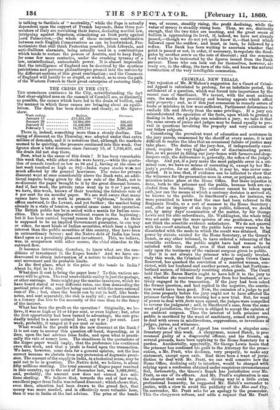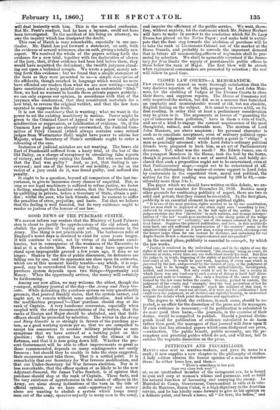CRIMINAL NEW TRIALS.
Tar rejection of Mr. M'Mahon's suggestion for a Court of Crimi- nal Appeal is calculated to prolong, for an indefinite period, the settlement of a question, which was forced into importance by the recent case of Smethurst. We invent, with the most anxious care, the media for providing and hearing appeals which affect only property ; and, as if this just concession to remedy errors of haste or mistakes in law were sufficient, Parliament determines to exclude life and liberty from the same privilege. If a jury can misunderstand the operation of the facts, upon which to ground a
finding in law, and a judge can misdirect a jury, we take it that the same errors of juries and judges may be found equally to pre- vail in questions involving the property and very existence of our fellow subjects. Considering the prevalent want of education and acuteness in
the jury panels, summoned by the sheriff at every assize, it is not difficult to realize the idea that an occasional failure of justice may take place. The duties of the jury-box, if independently exer- cised, require the very highest order of discriminating power. But, as we persist in filling our jury-boxes with farmers and shop- keepers only, the deliverance is, generally, the reflex of the judge's charge. And yet, if a jury make the most palpable error in a cri- minal case, we have no means of correcting it, except by her Ma- jesty's pardon, for an offence which, it may be, was never com- mitted. It is irue that, if evidence can be collected to show that the witnesses for the prosecution were in error, or perjured, an exa- mination takes place at the Home Office. Bat there injustice is done, both to the prisoner and the public, because both are ex- eluded from the hearing. The evidence cannot be taken upon oath,:nor can the means at which a contrary decision is arrived at, be known to the public. In Smethurst's case, for instance, we were permitted to know that the ease had been referred to Si, Benjamin Brodie, as a sort of assessor to the Home Secretary ; and, after an inquiry of six days in public, followed, we doubt not, by many days' examination of the matter, by Sir George Lewis and his able subordinate, Mr. Waddington, the whole trial was set aside upon the mere opinion of one gentleman, who did not think the scientific evidence satisfactory. We do not quarrel with the result attained, but the public have every reason to be dissatisfied with the mode in which the result was attained. Had power by statute existed for the Home Secretary, or the Queen's Bench, or any other tribunal, to have ordered a rehearing of the scientific evidence, the public might have had reason to be satisfied with the result, even if that result were achieved only upon the testimony of the eminent surgeon given in public.
But it is not always the prisoner who is unjustly treated.
Only this week, the Criminal Court of Appeal upon Crown Cases Reserved, has quashed the conviction of a married woman, con- victed, with her husband and another person, at the last Northum- berland assizes, of feloniously receiving stolen goods. The Court held that Mr. Y3aron Martin ought to have left it to the jury to say, whether she received the property from her husband, or ac- tively engaged in the transaction. If jury had been asked the former question, and had replied in the negative, the convic-; tion would have been good. Now, the omission of a judge to put the jssue properly before the jury ought not to have affected the prisoner further than the securing her a new trial. But, for want of power to deal with facts upon appeal, the judges were compelled to reverse the judgment ; and, in Smethurst s case, from the same want of jurisdiction, the Crown is obliged to accept the opinion of an eminent surgeon. Thus the interest of both prisoner and public is sacrificed by the want of machinery, armed with power, to deal with errors in misdireetions, suppressions, or inventions of judges, juries, and witnesses.
The value of a Court of Appeal has received a singular con-
firmatory proof this week. A clergyman, named Hatch, is pro- nounced guilty of a disgraceful offence, and his friends, on several grounds, have been applying to the Home Secretary for a pardon. Accidentally, apparently, Sir George Lewis hears that the prisoner has confessed his guilt to the Attorney for the prose- cation, a Mr. Pratt, who declines, very properly, to make any statement, except upon oath. Had there been a want of juris- diction to deal with Mr. Pratt, we can well conceive how the Home Office, declining only to interfere, would be charged with relying upon a confession obtained under suspicions circumstances, But, fortunately, the Queen's Bench has jurisdiction over Mr. Pratt, as one of its officers. And Mr. Pratt's explanation is one the clearest that could be given. Giving way to a little extra. professional humanity, he suggested Mr. Hatch's surrender to Justice, with a view to avoid the publicity of the Hue and Cry. On surrender, Mr. Pratt asks for an apology to the prosecutor. This the clergyman refuses, and adds a request that Mr. Pratt
will deal leniently with him. This is the so-called oonfession. But Mr. Pratt's conduct, had he been a layman, could not have been investigated. To the accident of his being an attorney, we owe the inquiry which has dissipated the doubt.
This case of Hatch is very remarkable, especially in one par- ticular. Mr. Hatch has put forward a statement, on oath, with the evidence of several witnesses, also on oath, giving a totally new aspect. We received the whole of the papers setting forth the evidence for a new trial, together with the declaration of eleven of the jury, that, if that evidence had been laid before them, they would have acquitted the defendant; the twelfth juryman stand- ing out upon a technical scruple. We wrote a paper, merely set- ting forth this evidence ; but we found that a simple statement of the facts as they were presented to us—a simple description of the affidavits, though couched in language which would no more have offended our readers than what we are now writing—would have constituted a truly painful story, and an undeniable "libel." Now, we had no warrant to handle these private papers publicly : we can only express our opinion, in accordance with that of the jurymen who condemned, that they constituted materials for a new trial, to reverse the original verdict, and that the law here operated to suppress the truth.
It is not the machinery that is wanting ; what we want is the power to set the existing machinery in motion. Power might be given to the Criminal Court of Appeal to order new trials after misdirection or suppression, or falsification of evidence. Or, if the Common Law judges are already overworked, the Judicial Com- mittee of Privy Council (which always contains some retired judges from Westminster Hall) might have power to advise her Majesty, whose Secretary of State's certificate ought to order a rehearing of the case. Instances of judicial mistakes are not wanting. The brave old Earl of Dundonald suffered from a hasty trial, at the bar of the Old Bailey, on a charge of conspiracy in circulating false reports of victory, and thereby raising the funds. But who now believes that the Earl was guilty ? And, as yet, that finding is un- reversed ; and one of the bravest of our nobility, so far as the vedict of a jury could do it, was found guilty, and suffered the penalty. It ought to be a question, beyond all comparison of the last im- rortanoe, to give to innocence every chance of acquittal. But, so long as our legal machinery is suffered to refuse justice, we foster a feeling, amongst the humbler orders, that the Smethursts may, by quibbling in private, before a Secretary of State, obtain a par- don ; whilst the poor, who lack friends, must be content to suffer the penalties of error, prejudice, and haste. Not that we believe that the feeling is well founded, but its very existence ought to render us jealous of the honour of our law.































 Previous page
Previous page